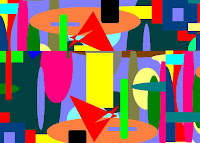Wrong is Wrong, but Two Wrongs Don't Make a Right
There's been so much written about the Danish cartoon controversy, so I hope I add something new to this debate. I've been disturbed by the reactions of some Muslims and non-Muslims, but I also see hope and positive reactions by others. The cartoons published by the Danish Jyllands-Posten depicting the Prophet Muhammad (pbuh) as a terrorist and in other offensive settings was irresponsible journalism. Adding to the controversy, French, Italian, and Spanish newspapers showed "support for freedom of speech" by republishing the cartoons that have already caused anger across the Muslim wold. The decisions by these newspapers were irresponsible and inciteful. As someone who puts a great value on freedom of the press, I was offended to see that such a freedom, which is so hard to attain in many parts of the world, is being abused by some individuals. Any freedom (speech, religion, press, etc) must have limits, or it will constitute a license to do whatever one wishes, even if it compromises the freedom of others. Freedom of speech has limits: slandering, lieing, and hate speech are not rights because they invade another preson's freedom to live in peace and security. Freedom of the press also has limits, and they should be respected. There is a difference between censoring news and opinions just because they offend an individual or group of people. However, refusing to publish an article, cartoon, or photo because it is inciteful shows responsibility and respect for the freedom of press by not allowing it to be abused by certain individuals.
That said, the reactions of Muslims across the word to these hate-filled cartoons were mixed. Some decided to use a powerful tool-- money-- to make their voices heard, that is by boycotting Danish goods, which has proved to be very effective in terms of losses for Danish companies. On the diplomatic side, ministers of various Arab and Muslim countries have met to condemn the publications and call on the newspapers and governments to apologize.
Some of the worst reactions, however, have been violent protests in various Muslim countries such as Indonesia and the Palestinian territories, where Danish and European officials have been threatened, flags burned, embassies vandalised, etc. These reactions are just as wrong as the publishing of the cartoons, as they only add to the growing stereotype of Muslims as violent and barbaric.
Although the boycott is an effective way that usually scares companies into doing what the consumer wants, it's not effective in explaining the reasoning behind the Muslim anger over the cartoons. Neither are the violent protests. Muslims should depict the essence of Prophet Muhammad's life (pbuh), in showing that the power of the word is much stronger than the power of the sword (or the wallet for that matter). Education is the main way that we can overcome ignorance and hate across the world, and Muslims need to contribute more to educating the West about our traditions and beliefs, so that bin Laden will not take it upon himself to do that in the ugliest possible way. Indeed, the Islamophobic cartoons will soon give OBL and his henchmen something to yap about in their next video that will actually appeal to the Muslims around the world. This is extremely dangerous, and many moderate and educated Muslims have been trying to tell the West that such actions will only isolate the average Muslim and intensify already prevalent anti-Western feelings.
Other prominent media outlets around the world have tried to avoid this controversy by opting not to publish the cartoons. CNN has decided not to publish them: "Muslims consider it sacrilegious to produce a likeness of the Prophet Mohammad. CNN has chosen to not show the cartoons in respect for Islam." (You can thank CNN for their decision here).
As for the BBC, the decision to not publish the cartoons has not saved the news organization from criticism from various European and British sources that argue the BBC is censoring the news and disrespecting the freedom of the press.
Peter Horrocks, the editor of TV News, said it had been a difficult dilemma.
"Obviously the BBC does not want to give offence to anyone on either side of this debate, so if people - whichever side of the argument they fall within - have taken offence, I am obviously concerned and apologise for that," he told NewsWatch.
"We've taken the view that still images that focus and linger on the offending cartoons would be excessively offensive so we haven't used those in our television news pieces."
That international perspective was also an important consideration for the news website, according to Steve Herrmann, editor of BBC News Interactive.
"When we cover any sensitive issue we have to balance our duty to report the story faithfully with our responsibility not to unnecessarily shock or offend our audience.
"It is not always an easy balance to strike, and much discussion and thought goes into decisions like these, but in making such judgements it is the interests, needs and expectations of our audience as a whole which are our guiding principle."








0 Comments:
Post a Comment
<< Home